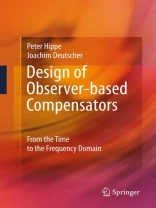Design of Observer-based Compensators facilitates and adds transparency to design in the frequency domain which is not as well-established among control engineers as time domain design. The presentation of the design procedures starts with a review of the time domain results; therefore, the book also provides quick access to state space methods for control system design.
Frequency domain design of observer-based compensators of all orders is covered. The design of decoupling and disturbance rejecting controllers is presented, and solutions are given to the linear quadratic and the model matching problems. The pole assignment design is facilitated by a new parametric approach in the frequency domain. Anti-windup control is also investigated in the framework of the polynomial approach. The discrete-time results for disturbance rejection and linear quadratic control are also presented.
The book contains worked examples that can easily be reproduced by the reader, and the results are illustrated by simulations.
Table of Content
Polynomial Matrix Fraction Descriptions.- State Feedback Control.- State Observers.- Observer-based Compensators.- Parametric Compensator Design.- Decoupling Control.- Disturbance Rejection Using the Internal Model Principle.- Optimal Control and Estimation.- Model-matching Control with Two Degrees of Freedom.- Observer-based Compensators with Disturbance Rejection for Discrete-time Systems.- Optimal Control and Estimation for Discrete-time Systems.
About the author
Peter Hippe was born in Berlin in 1941. He received the Dipl.-Ing. degree in mechanical engineering from Universität Stuttgart, Stuttgart in 1969 and the Dr.-Ing. degree from Friedrich-Alexander Universität, Erlangen in 1976. Since then he has been teaching in the Electrical Engineering Department. His main research interests are in the time and frequency domain design of compensators and the problems caused by constrained actuators. He has coauthored the book Zustandsregelung (Springer, 1985) and he is the author of the book Windup in Control (Springer, 2006)
Joachim Deutscher was born in Schweinfurt, Germany in 1970. He received the Dipl.-Ing. (FH) degree in Electrical Engineering from Fachhochschule Würzburg- Schweinfurt-Aschaffenburg in 1996, the Dipl.-Ing. Univ. degree in Electrical Engineering and the Dr.-Ing. degree from Universität Erlangen-Nürnberg in 1999 and 2003, respectively. He is head of the nonlinear control systems group at the Lehrstuhl für Regelungstechnik, Universität Erlangen-Nürnberg. His main research interests are in nonlinear control and in the application of polynomial matrix methods in control.












